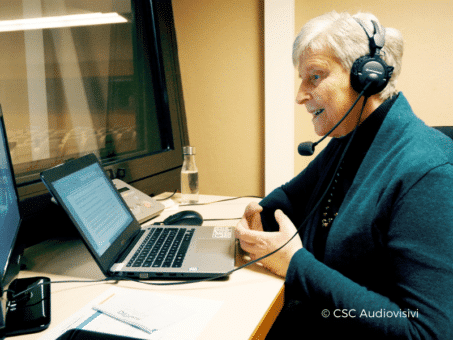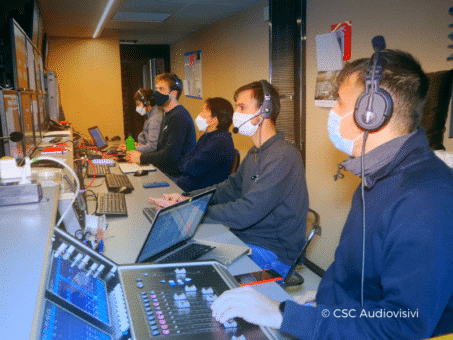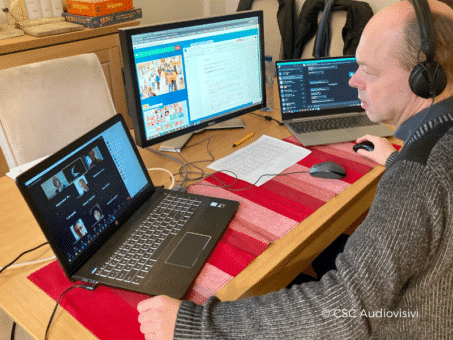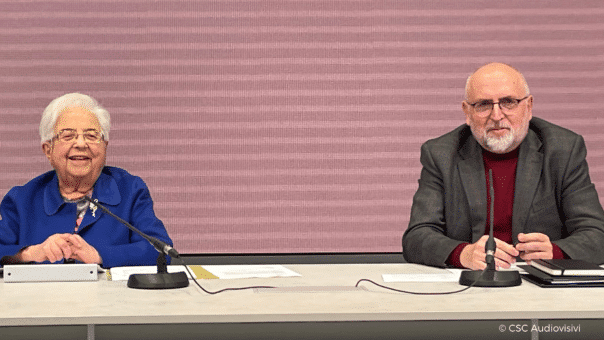Meet the participants: Gail and Carlos Freire
How to watch English subtitles, click here https://youtu.be/WXdE7Z4PfU0
How to watch English subtitles, click here https://youtu.be/WXdE7Z4PfU0

General Assembly Diary 7 30 January 2021 As the Assembly continues to work on the priorities and lines of action for the next six years, today we’d like to offer a glimpse behind the scenes, to get to know the people who are keeping the “machine” working, without whom none of this could happen. The online nature of the event called for a network of collaborators and technicians specialized in different fields, indispensible not only for the efficacy of the digital platform but also to guarantee the juridical validity of this Assembly.  No less than 73 people comprise the technical team of the Focolare General Assembly. Many are physically present in the Movement’s international centre at Rocca di Papa in Italy, while others collaborate remotely from many parts of world including Brazil, the Philippines, France, Guatemala, Britain, Ireland, Italy, the Netherlands, Spain, Thailand and USA. Twenty I.T. experts are working on the web pages and various apps. 14 hosts, divided into two teams, run all the various video-conferences. 34 translators in 7 countries guarantee the participants have simultaneous translations in 5 languages (French, English, Italian, Portughese and Spanish). Then there is the 5-person squad responsible for the general coordination of all the technical teams. But it’s more than a network of collaborators or technical experts, according to Francesco Mazzarella, one of the video-conference hosting team working from Sicily. He writes:
No less than 73 people comprise the technical team of the Focolare General Assembly. Many are physically present in the Movement’s international centre at Rocca di Papa in Italy, while others collaborate remotely from many parts of world including Brazil, the Philippines, France, Guatemala, Britain, Ireland, Italy, the Netherlands, Spain, Thailand and USA. Twenty I.T. experts are working on the web pages and various apps. 14 hosts, divided into two teams, run all the various video-conferences. 34 translators in 7 countries guarantee the participants have simultaneous translations in 5 languages (French, English, Italian, Portughese and Spanish). Then there is the 5-person squad responsible for the general coordination of all the technical teams. But it’s more than a network of collaborators or technical experts, according to Francesco Mazzarella, one of the video-conference hosting team working from Sicily. He writes:  Behind the online Assembly, a group of people around the world, the so-called technical experts, have been ‘meeting’. We’ve been getting to know each other and creating a bond far beyond the technical aspect because there’s been a spiritual sharing among us too. It’s come about gradually, through a process of what we could call ‘techno-relationship’. Most of the time, we don’t think about all that has to happen before an event can take place. Today, the challenge goes via the internet, with the all uncertainties and challenges involved, and with all the possibilities it contains too. To manage these moments online without seeing each other face to face, without being able to physically shake each other by the hand, is the real challenge of this Assembly.
Behind the online Assembly, a group of people around the world, the so-called technical experts, have been ‘meeting’. We’ve been getting to know each other and creating a bond far beyond the technical aspect because there’s been a spiritual sharing among us too. It’s come about gradually, through a process of what we could call ‘techno-relationship’. Most of the time, we don’t think about all that has to happen before an event can take place. Today, the challenge goes via the internet, with the all uncertainties and challenges involved, and with all the possibilities it contains too. To manage these moments online without seeing each other face to face, without being able to physically shake each other by the hand, is the real challenge of this Assembly.  But the greatest issue for the technicians is about making a gift of our own competencies, which have been acquired through much personal sweat and study. This requires a kind of exchange of trust. Let me explain myself. A technican, even those who have made a choice to follow the principles of the spirituality of unity in their work, is still a professional who takes personal pride in their work and their own skills. The willingness to share methods or procedures that have been learnt with so much personal effort and study is not automatic. It requires a real act of faith, trusting that the others are there out of love, trusting that by so giving we are contributing to building the Assembly. So it’s a connection of electronic signals and of souls which constitutes the foundation and techo-relationships of this adventure called our online Assembly. Usually, the technicians only come to our attention when something isn’t working properly. In this Assembly, it’s different. Their work and their “style” are building this event, day by day. Thanks to each one of them!
But the greatest issue for the technicians is about making a gift of our own competencies, which have been acquired through much personal sweat and study. This requires a kind of exchange of trust. Let me explain myself. A technican, even those who have made a choice to follow the principles of the spirituality of unity in their work, is still a professional who takes personal pride in their work and their own skills. The willingness to share methods or procedures that have been learnt with so much personal effort and study is not automatic. It requires a real act of faith, trusting that the others are there out of love, trusting that by so giving we are contributing to building the Assembly. So it’s a connection of electronic signals and of souls which constitutes the foundation and techo-relationships of this adventure called our online Assembly. Usually, the technicians only come to our attention when something isn’t working properly. In this Assembly, it’s different. Their work and their “style” are building this event, day by day. Thanks to each one of them!
Focolare Communications Office
The story of Irena, a doctor in Lithuania who is a member of the Focolare Movement in Eastern Europe who was infected with the Covid-19 virus. She experienced both the fatigue of illness and the strength in God’s love through prayer. “I’m inundated with messages and prayers. I don’t even know how my friends, acquaintances, colleagues hear about it. Even friends who I didn’t even know knew how to pray are praying. I had no idea that so many people could join in prayer for my health.” Irena is a hospital doctor, a member of the Focolare Movement who lives in Lithuania, in Eastern Europe. During these months that her country has been affected by the Covid-19 pandemic, her work became exhausting, and she was infected by the virus and experienced all the fatigue of the disease. But her strength, she says, has come from her trust in God’s love. Her discovery of being united with many people in prayer rewarded her personal efforts and gave energy to her healing journey. Her experience was particularly hard. At first, work on the ward continued at the usual pace, but soon the contagion spread among her colleagues. Irena found herself working alone. “I had to find places for staff to be sent to isolation,” she explains, “to settle patients who had to be discharged because there was no one to care for them and contact relatives so they could take care of them. “There were no masks for the patients, and I would hand them out my own. Once, with a colleague who stayed after hours, we examined 37 patients. Only the night was calm, and I could pray.” After days in the hospital without rest, Irena was able to return home. Yet it was with the knowledge that she had contracted the disease. She was relieved to feel the spiritual closeness of Focolare founder Chiara Lubich. “On the shelf next to my bed there was a photo of Chiara smiling, and I saw her as if for the first time. She smiled at me and I smiled at her, everything became easier.” Gradually, the symptoms of the disease became more burdensome, but Irena did not give in to the pain. “I lost my taste receptors and realized that even the sense of taste is a gift from God. I offered my suffering for my colleagues and for my country. The nights were very difficult, but Chaira was with me smiling.” When the disease became more aggressive, hospitalization became inevitable, and this brought new challenges. “I no longer had the strength to speak, and I underwent an experimental treatment. The person in charge took care of me, but the nurses forgot to bring me my medication and didn’t ask if I had the strength to take food from the cart. But I could offer these hardships as well.” Here, too, help came from those close to her. “In my room there was a lady with cancer, and she brought me food, drinks. We became friends, and when I felt better, we prayed together.” Feeling united in prayer with the many people who prayed for her allowed Irena to feel loved, by God and by her brothers and sisters. “I am grateful to God for the indescribable love that I experienced during my illness,” she says, “because I always felt him near me, and for the beautiful experience of common prayer, which has huge power, and God has allowed me to experience it live. I feel reborn.”
Claudia Di Lorenzi
How to watch English subtitles, click here https://youtu.be/fDVpXyp9InE
How has Maria Voce lived her role as the first President of the Focolare Movement after Chiara Lubich? In a recent interview with Vatican Radio on 27 January, she speaks of the current situation of the Movement and how it relates to the message of Pope Francis. We publish some of the main areas covered. It’s certainly no small undertaking to preside over such a vast and complex reality as the Focolare Movement, with over 2 million people adhering to its message in 182 countries. The outgoing president is Maria Voce, born in Cosenza Province in southern Italy, a lawyer by profession, with further studies in theology and canon law. In this interview for Vatican Radio, she recounts her experience of 12 years at the helm of the Movement. Joys and sufferings, even failures here and there, limitations and opportunities: the life of the Movement has surely always been made of these, and in recent years too. If you had to describe in just a few words what the reality of the Focolare is today, what would you say? I could describe it as a tree, a tree which may have shed some of its blossom and leaves, perhaps becoming more autumnal as an image, but a tree all the same with very strong roots still intact. These roots are capable of containing and maintaining the lymph and warmth necessary for nourishing the seeds of this tree, which have already spread throughout every continent across the world. Therefore it still has the possibility of continuing to nourish them and make them germinate, as they are in fact germinating in many places. Just now, maybe we see them in a winter setting, with winter temperatures, but it’s actually in winter that the seeds mature below ground in order to be able to flower in spring. And I think it’s a tree that’s preparing a new spring time in the Movement. Pope Francis and the Focolare Movement: you are obviously in great accord from the perspective of openness to dialogue and the need to build a different kind of world. In particular, the Pope’s appeal for fraternity in the human family finds the Movement in the front line in terms of dialogue with members of other religions and with those of non-religious beliefs. How do you see the Movement’s contribution in this? I think it’s essential. Because it was always essential to Chiara from the very beginning. Undoubtedly through the grace of the charism of unity received from the Holy Spirit, from the start she felt drawn to approach every person in the spirit of fraternity. And she did this all the time, whoever she met. Catholics in the early days, from the Monsignors who were interrogating her, as we saw in the new film about Chiara, to the poor people living in Trento. The same when she met members of other Churches, of other religions or people without a religious faith. Chiara met brothers and sisters in everyone, and she treated them as such. Chiara taught us this approach and it remains in the Movement, and we see this as an extraordinary source of power. We’ve also recognized it in these days leading up to our Assembly. Members of the Movement who belong to different Churches and religions, or who are of good will without a specific religious affiliation, have been active in the preparations, testifying in particular to the power of love which is capable of creating relationships at all levels, capable of overcoming conflicts, capable of enabling you to meet together with people from a different religion to your own, even if up to yesterday you were sworn enemies. But now, we discover one another as persons, who can pray together, who can together seek the meaning of life, the significance of the pandemic, what it means to live for others, to act in solidarity with others. We’ve seen it in their words of wisdom, in their interest in what the Movement is preparing, in their active participation in the Assembly preparations, with their suggestions, with their life, because obviously inspired by the same Holy Spirit who moves beyond all borders and all barriers. So I have the impression that it’s this contribution which the Pope feels he can count on. But not only the Pope, the whole Church and all humanity. Because there’s a dire need for this fraternity and the Movement has a special grace to build it precisely because of the charism of unity which comes from Chiara. Talking about relationships, you recently made some strong comments about the need for the Movement to take a new step in understanding that God is not only Love, but also Trinity … God is Trinity, which means God in himself is relationship. This means that all who seek God, must build relationships in order to find him. And I don’t believe there’s anyone who is not searching for God. They might search for the truth, and God is truth. They might seek beauty, and God is beauty too. They might search for goodness in the world, and God is also goodness. God is everything any human being can search for and can be found if we build relationships. And I believe everyone is capable of this, because we’re all created in the image of God, in the image of God Trinity. According to your Statutes, the President of the Work of Mary will always be a woman. I believe the Movement is one of the few places in which you could say being a woman is actually an advantage. But it’s also sending a good message to civil society and the Church … I must admit to be somewhat perplexed by the use of the word “advantage”. Because to tell you the truth, being at the head of a Movement like ours actually means being the first to serve, the first to increase your acts of love, the first to accept any kind of challenge, anything and overcome it with the help of God and of your brothers and sisters. So, while in one sense, it might be an advantage to be considered capable of being elected, I don’t really think this is the spirit in which we live it. And I don’t think the Focolarine women, who are the only ones who can ‘aspire’ to this, if you must put it this way, I don’t they live it like that. It’s much more with a spirit of love and service for Chiara’s Work which everyone wishes to continue to serve with the same love as Chiara loved and guided and served the Movement. And then, I do also think it can be a testimony to the kind of equality, of profound fraternity, of equal dignity, that goes beyond the differences of gender, which God brought to the world when he created humankind in his image and created male and female. So united in this complementarity, which respects diversity and enables each one to emerge in their own capacity to give, which will of course be different because God made two different beings, different but made to be together and to build humanity together in his image and likeness. In this sense, I think it can be seen as a sign of progress, of something emerging more and more in the Church and in society. But I think it’s nothing other than a manifestation of the Marian profile of the Church, the profile which says that Mary is woman, mother, but queen too, also with her Son on Calvary founder of the Church, ‘coredemptrix’ of humanity, principle of unity for all. In this sense, then, I think yes it’s a privilege the Movement can be proud of and can offer to the Church and the world as an example and forerunner, in some way. Maria Voce, today what do you wish for the Work of Mary of the future? For the Movement, I would wish, like Chiara, for the greatest fidelity to the Gospel, faithfulness that can reach a heroic level, because it’s fidelity to living the Gospel concretely. And I would say, for this Work to continue it’s journey, faithfulness to that word of the Gospel which God wished to pronounce by sending this charism, namely the word “unity”. So, faithfulness to this unity, which must be total. It must be capable of living relationships as they’re lived in the Trinity, in order to testify to the world that God exists, that through the Movement he can bring fraternity more widely in the Church and in the world, to contribute to fulfilling the prayer of Jesus, “Father, that they may all be one”.
Adriana Masotti
Click here for the full interview (in Italian)

General Assembly Diary 5 – January 28, 2021 Today, at the Focolari Assembly it has been a day of assessment. The programme included group discussion on the President’s report on the past six years. The participants received the document over a week ago and so each one had time to examine it in detail. Many questions emerged; some of which were put to the President Maria Voce and to Co-President Jesús Morán in the early afternoon.

Maria Voce and Jesús Morán
Focolare Communications Office